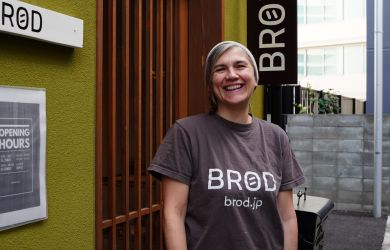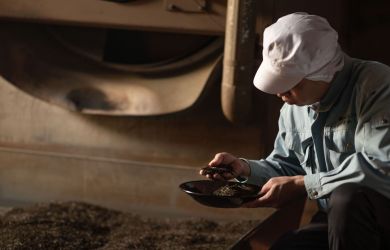
March 10, 2005
The Other Side of Cape Town
Township tours offer a vibrant glimpse of daily life in South Africa
By Metropolis
Originally published on metropolis.co.jp on March 2005

Photos By Simon Richmond
South African townships, such as Khayelitsha in Cape Town, are hardly your average holiday destination. These shanty settlements created to house black South Africans during apartheid are generally rife with poverty, AIDS, drugs and crime. Livestock wander the dusty streets, along which many homes are little more than lean-to shacks with communal toilets and water coming from a standpipe.
Nevertheless, township tours have become one of the most popular activities on offer in Cape Town, with scores of operators running bus trips around the oldest and largest—Langa, Guguletu, Crossroads and Khayelitsha, which lies on the Cape Flats east of the city center and is home to an estimated 1.8 million black Capetonians. The success of such tours, which run the risk of being voyeuristic, are down to locals and their desire to show that township life in the new South Africa is far more positive, hopeful and vibrant than many would expect.
Over a decade from the end of apartheid, Cape Town has evolved into the most rainbow-colored city in South Africa’s “rainbow nation.” People of all skin tones and races mingle with apparent harmony across the city, from the top of Table Mountain to the beaches and wind-blasted cliffs of Cape Point. African culture and art is everywhere, be it in the form of the multicolor beaded dolls made by Monkeybiz, a local business that employs the talents of township women, or kwaito, a South African style of hip-hop danced to at clubs such as Snap, just off Long Street.
Still, when it comes time to go home, Cape Town remains a city divided along color lines. Visitors bedding down in the chic guesthouses of ritzy suburbs, such as Tamboerskloof or Oranjezicht up on the slopes of Table Mountain, or in the boutique hotels of Camp’s Bay see only the affluent white side of the city. Naturally, many are curious about township life, and that’s where the tours have found their niche.
Most tours kick off at the excellent District Six Museum in the city center. Here you’ll learn about the apartheid system and how it came to destroy areas such as District Six, where all races lived side by side. Some 30 years after the bulldozers moved in, the area, renamed Zonnebloem (Sunflower in Afrikaans), is undergoing a revival with new houses being built for displaced former residents.

From the museum, the tours head east to the Cape Flats townships. Among the sights there are the Guga S’Thebe Arts and Cultural Center in Langa, brilliantly decorated with gorgeous ceramic murals, and the nearby Tsoga Environmental Resource Centre, where Prince Charles planted a tree in 1997. A variety of community-based projects get a look in, including the Philani Nutrition Centre in Crossroads, which runs a weaving factory and a printing operation creating rugs, wall hangings and cards; and Rosie’s Soup Kitchen, where the saintly Rosie has been serving some 600 meals a day to the poor for years. If you’re in Khayelitsha on Monday or Thursday, the craft market at St. Michael’s Church is a great place to shop for interesting souvenirs.
The most popular stop here for most visitors, though, is Vicky’s B&B, home of the irrepressible Vicky Ntozini. In the late ’90s Vicky was one of the first Khayelitsha residents to turn her home—which, like many others in the township, is built of scrap—into a guesthouse. Ntozini, a mother of four, is typical of the determined, jovial Xhosa women who have kept their communities going through good times and bad. She happily chats day after day to the busloads of tourists who drop by, ensuring that they receive a far more accurate picture of what life is like in the townships.
If guests stay over, they get their own comfy room, while the rest of the family cram into the other bedroom. The home also has an indoor shower and toilet, a gift from a local hotel chain. Ntozini will invariably take you for a stroll through the neighborhood, meeting up with friends along the way and popping in at Cape Town’s “other” Waterfront, a sheeben (township pub) for a home-brewed beer. Later you’ll be treated to traditional African dishes such as samp (a thick maize porridge) or even a “smiley”—a grinning sheep’s head, stewed then caramelized by blowtorch!
All the comforts of home are also in place at Kopanong, the most upmarket of Khayelitsha’s growing band of B&Bs. The dynamic Thope Lekau, who’s a registered guide and experienced development worker, lives in the most affluent part of Khayelitsha, where the reasonably large brick homes are practically palaces compared to shacks such as Ntozini’s. Kopanong offers two stylishly decorated rooms, one with an en-suite bathroom, the other with its own separate shower.
Lekau has had diplomats and overseas politicians come to stay. Like many others, they have found that bedding down in Khayelitsha is highly recommended for fully experiencing life in the townships and going beyond the token meetings with locals offered by the day tours. It’s really only this way that you’ll experience the warm and generous hospitality that black South Africans called ubuntu.
The fastest flights to Cape Town from Tokyo go via Singapore on Singapore Airlines or Kuala Lumpur on Malaysian Airlines. The cost is from ¥135,000 round-trip. Vicky’s B&B (Tel: 27-21-387-7104 or 27-21-82-225-2986; www.journey.digitalspace.net/vicky.html) and Kopanong (Tel/Fax: 27-21-361-2084; kopanong@xsinet.co.za) Both charge around R210/360 (¥3,750/6,400) for a single/double with breakfast. Lots of operators offer township tours. The half-day tours are sufficient; the full-day ones tack on a trip to the UN World Heritage site of Robben Island (www.robben-island.org.za), former prison of Nelson Mandela, which is best done separately and for which you don’t need a guide. Recommended operators include Grassroute Tours (27-21-706-1006, www.grassroutetours.co.za) and Sam’s Cultural Tours (Tel: 27-21-423-5417, Fax: 27-21-082-970-0564), run by Sam Ntimba, who also works for Day Trippers (www.daytrippers.co.za) on its township tours. Check out Cape Town tourism’s website at www.tourismcapetown.co.za.
[geo_mashup_map]





